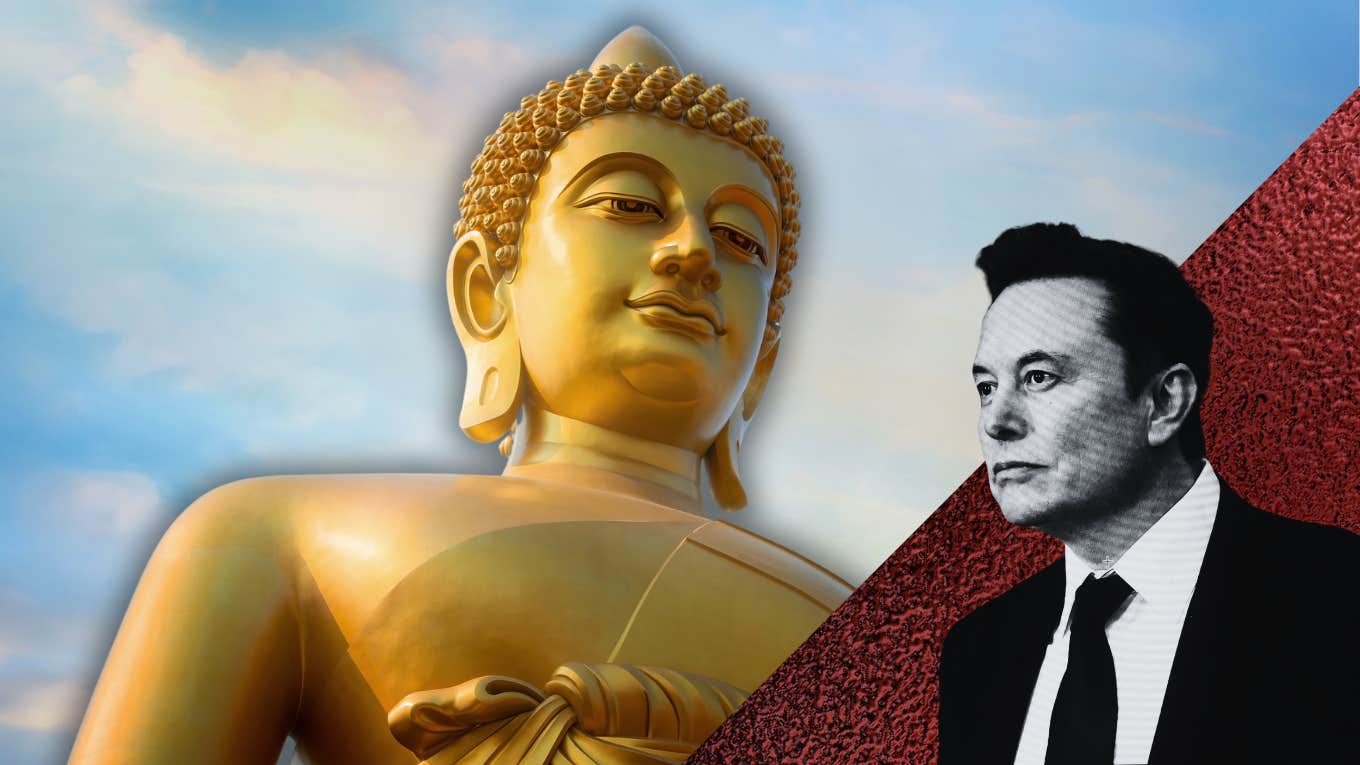Former Head Of DEI At Tesla Reveals The 3 Ways Elon Musk Is Basically The Opposite Of Buddha
If anything, Elon Musk's agenda directly opposes the values that Buddha practiced and taught.
 Design: YourTango | Photo: cowardlion, Photo Agency from Shutterstock
Design: YourTango | Photo: cowardlion, Photo Agency from Shutterstock It's been approximately 100 days since Elon Musk entered the White House as President Donald Trump's "senior advisor" and leader of the "Department of Government Efficiency" (DOGE). Over the last few months of Musk's involvement in American politics, the 53-year-old founder of Tesla has convinced many that he is committed to plunging this country and its government into chaos.
During a recent interview about the future of DOGE, Musk compared himself to Buddha. His comparison, rightfully so, came with intense backlash, especially from Kristen Kavanaugh, the former head of diversity, equity, and inclusion (DEI) at Tesla, who stressed that Musk is the complete opposite of the religious teacher.
The former head of DEI at Tesla revealed 3 ways Elon Musk is the opposite of Buddha.
Musk and three top DOGE team members sat down with a dozen mainstream news reporters in the West Wing's Roosevelt Room to reflect on his time in the Trump administration. Musk previously indicated that he plans to step back from his DOGE role at some point this month, and when asked by reporters who would lead the department in his absence, he had a surprising response, according to The Washington Post.
"Is Buddha needed for Buddhism?" Musk said. "Was it not stronger after he passed away?"
Despite his comparison, Musk is far from Buddha. His policies since becoming the head of DOGE and Trump's lapdog have aimed to disrupt the American government and push a fascist agenda. Kavanaugh, Tesla's former head of DEI, took to TikTok to set the record straight.
"I'm the former head of DEI at Tesla, and Elon Musk just compared himself to Buddha. Do you know how upsetting it is, given everything that Elon has said about DEI and how we treat people, that he had the nerve to compare himself to Buddha?" Kavanaugh asked. "No, Elon, you're not Buddha.
1. Buddha believed in compassion; Musk believes in chaos.
Compassion, or karuna in Sanskrit, was one of Buddha's main teachings. It describes a wish for others to be free of suffering. Yet, as Kavanaugh pointed out, everything Musk has done since entering the White House has directly gone against the American people and added to many citizens' suffering.
A prime example would be Musk's dedication to ridding corporations and the federal government of their DEI initiatives. Musk and his team have faithfully carried out Trump's executive order eliminating diversity, equity, and inclusion efforts throughout the government. In a post on X, DOGE's social media account wrote that by January 29, about $1 billion in contracts related to diversity, equity, inclusion, and accessibility had been terminated, including at the Department of Education, the Pentagon, and the National Oceanic and Atmospheric Administration (NOAA).
Musk has also made numerous statements regarding DEI, including calling it "just another word for racism," which is blatantly false and deeply disrespectful to those who have fought for equal opportunity for all, especially in the workplace.
2. Musk is the wealthiest man in the world; Buddha renounced all wealth.
According to Bloomberg's Billionaire Index, Musk is the richest person in the world, with an estimated net worth of around $332 billion. Many of the policies that he's co-signed under the Trump administration were intended to line his pockets and make the wealthy wealthier.
According to Buddha's early teachings, greed, or raga, is one of the "three poisons" that cause most of the world's problems. Musk's hoarding of wealth and using his power to dismantle systems meant to help the disadvantaged is the epitome of greed and the antithesis to Buddha's beliefs.
3. Buddha believed in serving humanity; Musk believes in serving himself.
Musk has proved numerous times since joining the Trump administration that he only cares about advancing his interests, brand, and influence. From attempting to offer buyouts to all 2.3 million federal employees as part of his plan to cut the federal workforce to shuttering the U.S. Agency for International Development, a federal agency that oversees foreign aid, Musk has demonstrated that he only has the best interests of himself and the 1% in mind.
Buddha, on the other hand, believed in generosity, or dana. "In Buddhism, generosity is not just a one-time act but a way of life. It is about embodying an open-hearted and selfless attitude in our daily interactions with others," Lion's Roar explained. "Ultimately, the practice of generosity is the path to greater happiness, inner peace, and spiritual awakening."
There is simply no comparison between Elon Musk and Buddha because they are not even remotely similar. Frankly, it's disrespectful to claim similarity to someone who dedicated his life to ending suffering, promoting compassion, and rejecting the core ideas that make up capitalism. If anything, Musk has shown that his values and interests are in direct opposition to what Buddha stood for.
Nia Tipton is a staff writer with a bachelor's degree in creative writing and journalism who covers news and lifestyle topics that focus on psychology, relationships, and the human experience.

